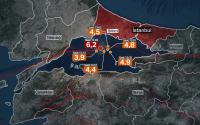8 November 2007EurActiv
"The Age of Consequences" report, produced by the Center for Strategic and International Studies (CSIS) in the US, predicts that scarcity of resources may "dictate the terms of international relations" for years to come as rich countries could "go through a 30-year process of kicking [the poor] away from the lifeboat".
Earlier in April, the UN had already concluded that it is the world's poorest regions that are set to suffer most from global warming (EurActiv 10/04/07).
Leon Fuerth, once national security adviser to former Vice President Al Gore and a leading author of the CSIS report, said: "Some of the consequences [of climate change] could essentially involve the end of globalisation as we have known it", with different parts of the world turning inwards to conserve what they need to survive.
The latest forecasts follow an April report from a US military think tank, which made the link between global warming and terrorism and called for climate change policy to become an integral part of national security and defence policies (EurActiv 17/04/07).
Fuerth believes that "the kinds of hatred that build up between different groups will be accentuated as [they] attempt to move to more clement locations on the planet".
Assuming that the Earth experiences global warming of 1.3 degrees Celsius and a sea-level rise of nine inches by 2040, the report predicts "a scenario in which people and nations are threatened by massive food and water shortages, devastating natural disasters and deadly disease outbreaks". Such a scenario, they add, could happen even if the US enters into a global cap-and-trade system for CO2 emissions.
A July report from the US National Petroleum Council had predicted that the United States would have to diversify its energy supply and reduce C02 emissions if it is to address concerns over its future oil supply (EurActiv 19/07/07).
The CSIS report also predicts internal and cross-border migrations related to climate change - particularly in South Asia, Africa and Europe - as people are forced to move in search of food and water, as well as to flee rising seas and more widespread flood, drought and storm devastation.
John Podesta, former chief of staff to Bill Clinton and president of the American Progress think tank, predicted in the report that "in the Middle East, the politics of water will hold sway, with the Jordan river creating a physical link to the interests of Syria, Lebanon, Jordan, Israel and the Palestinian Authority".






